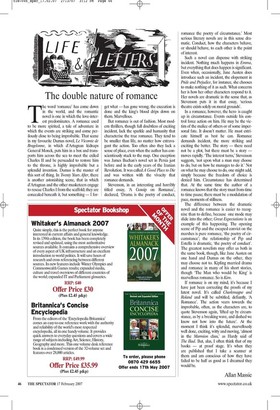The double nature of romance
The word 'romance' has come down in the world, and the romantic novel is one in which the love-interest predominates. A romance used to be more spirited, a tale of adventure in which the events are striking and come perilously close to being improbable. That scene in my favourite Dumas novel, Le Vicomte de Bragelonne, in which d'Artagnan kidnaps General Monck, puts him in a box and transports him across the sea to meet the exiled Charles II and be persuaded to restore him to the throne, is highly improbable but a splendid invention. Dumas is the master of this sort of thing. In Twenty Years After, there is another astonishing scene, that in which d'Artagnan and the other musketeers engage to rescue Charles I from the scaffold; they are concealed beneath it, but something — I forget what — has gone wrong; the execution is done and the king's blood drips down on them. Marvellous.
But romance is out of fashion. Most modern thrillers, though full doubtless of exciting incident, lack the sparkle and humanity that characterise the true romance. They tend to be smaller than life, no matter how extravagant the action. Too often also they lack a sense of place, even when the author has conscientiously stuck to the map. One exception was James Buchan's novel set in Persia just before and in the early years of the Iranian Revolution. It was called A Good Place to Die and was written with the vivacity that romance demands.
Stevenson, in an interesting and horribly titled essay, 'A Gossip on Romance', declared, 'Drama is the poetry of conduct, romance the poetry of circumstance.' Most serious literary novels are in this sense dramatic. Conduct, how the characters behave, or should behave, to each other is the point of interest.
Such a novel can dispense with striking incident. Nothing much happens in Emma, but everything that does happen is significant. Even when, occasionally, Jane Austen does introduce such an incident, the elopement in Pride and Prejudice, for instance, she chooses to make nothing of it as such. What concerns her is how her other characters respond to it. Her novels are dramatic in the sense that, as Stevenson puts it in that essay, 'serious theatre exists solely on moral grounds'.
In a romance, however, the hero is caught up in circumstance. Events outside his control force action on him. He may be the victim of the malice of others or of some impersonal fate. It doesn't matter. He must extricate himself as best he can. Romance demands incident, the more striking and exciting the better. The story — there need not be a plot, but there must be a story — moves rapidly. 'The interest turns,' Stevenson suggests, 'not upon what a man may choose to do, but on how he manages to do it.' Not on what he may choose to do, one might add, simply because the freedom of choice is denied him Circumstance has determined that. At the same time the author of a romance knows that the story must from time to time pause; there must be a modulation of pace, moments of stillness.
The difference between the dramatic novel and the romance is easier to recognise than to define, because one mode may slide into the other; Great Expectations is an example of this happening. The opening scene of Pip and the escaped convict on the marshes is pure romance, `the poetry of circumstance'; the relationship of Pip and Estella is dramatic, `the poetry of conduct'. The greatest novelists may offer us both in the same book, though, like Jane Austen on one hand and Dumas on the other, they may choose not to. Kipling married drama and romance in many of his short stories, though 'The Man who would be King' is marvellous romance. So is Kim.
If romance is on my mind, it's because I have just been correcting the proofs of my latest novel. It's called Charlemagne and Roland and will be subtitled, defiantly, 'A Romance'. The action veers towards the improbable, often, as the characters are, to quote Stevenson again, 'lifted up by circumstance, as by a breaking wave, and dashed we know not how into the future'. At the moment I think it's splendid, marvellously well done, exciting, witty and moving, 'almost in the Mamnon class,' as Hardy said of The Iliad. But, alas, I often think that of my books — at proof stage. It's when they are published that I take a scunner at them and am conscious of how they have failed to be half as good as I dreamed they would be.

























































 Previous page
Previous page